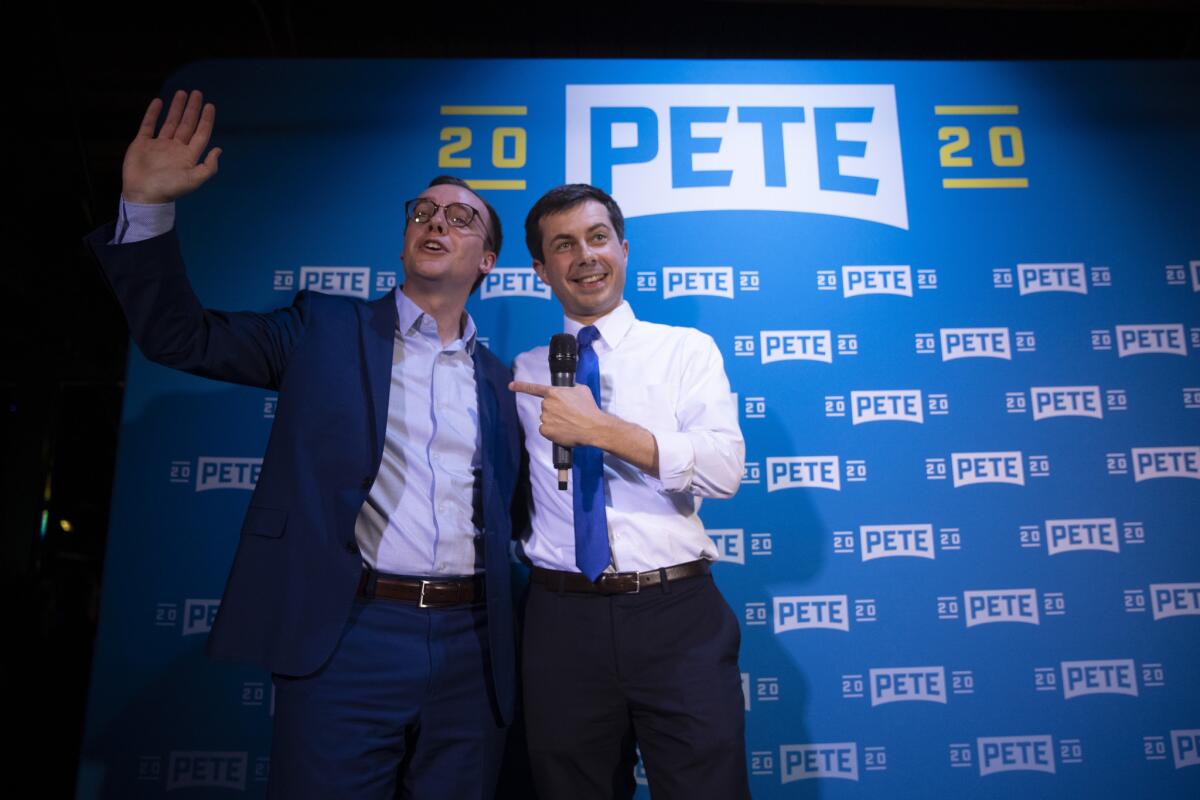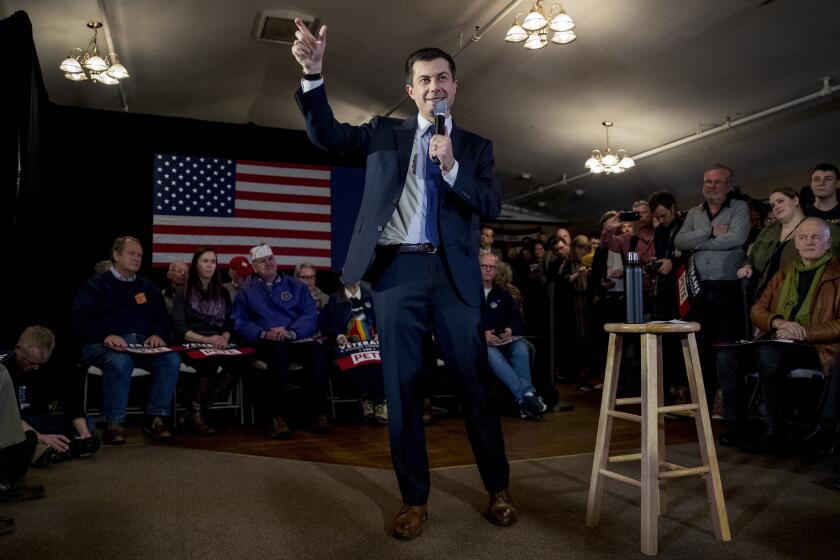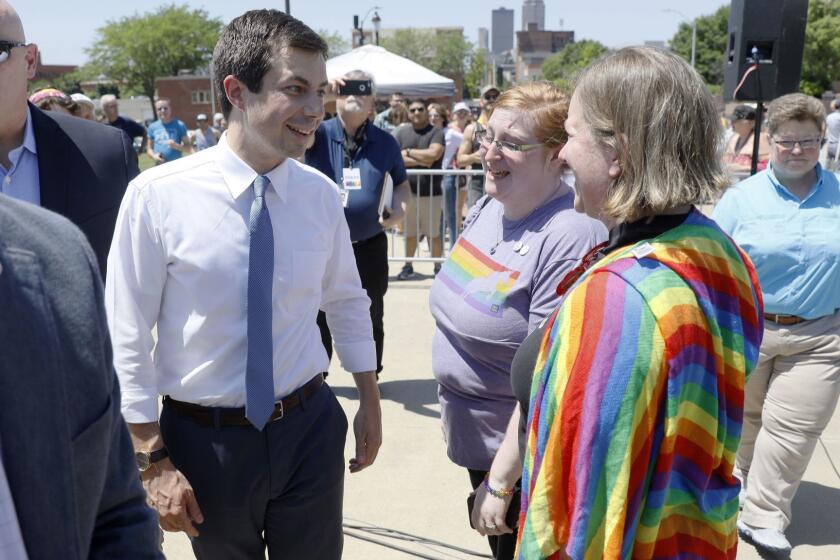Obscured in the Iowa upheaval, Pete Buttigieg sets a gay rights milestone

- Share via
In the upheaval of the botched Iowa caucuses Monday night, it was easy to miss the moment when Pete Buttigieg called on cheering supporters at his Des Moines victory party to applaud his husband, “the future first gentleman of the United States.”
Yet Buttigieg’s virtual tie with Sen. Bernie Sanders for first place in the opening contest of the Democratic presidential race marked a milestone, many gay rights activists said. For the first time, an openly gay candidate for president won delegates to a major party’s national convention.
“It’s an incredible leap forward from where we were a few decades ago,” said Ethan Geto, a New Yorker who has been at the vanguard of the gay rights movement since the 1970s. “It has enormous symbolic significance.”
In a CNN town hall on Thursday, Buttigieg said he was not running to be the first gay president, but hoped to inspire young people who question whether they fit in with their families or communities.
“We’ve got a long way to go when it comes to LGBTQ equality right now,” he said. “But I think the fact that I’m standing here, the fact that my husband is in the audience watching right now, is just an amazing example of that belief that, yes, yes — you belong. And this country has a place for you.”
Without mentioning his sexual orientation, Buttigieg is using the same theme of belonging in a television ad airing in New Hampshire in the days before the state’s presidential primary on Tuesday.
“If you are ready to build an American life defined by belonging,” he says, “this is our chance.”
Pete Buttigieg has won new looks from New Hampshire voters, but even a robust performance here may not help him win over minority voters in key primary states.
Charlotte Clymer, press secretary at the Human Rights Campaign, an LGBTQ civil rights group that is neutral in the Democratic race, said Buttigieg’s rise to the top tier reflected the country’s rapid cultural change toward broader acceptance of LGBTQ Americans.
“This is a seismic shift,” she said.
Anti-gay bias has hardly disappeared. Hate crimes against LGBTQ people remain a serious problem: Of the 7,120 bias-crime incidents reported in 2018, nearly 1,200 were based on gender or sexual orientation, according to the FBI. And several dozen transgender people, many of them women of color, have been murdered over the last two years.
At the same time, however, public opinion on LGBTQ issues has shifted dramatically and quickly. In 2004, just 31% of American adults approved of same-sex marriage, but by last year, 61% did, according to the nonpartisan Pew Research Center.
The shift in public opinion is among the fastest on a major public issue that pollsters have measured. By contrast, a majority of Americans did not support interracial marriage until the 1990s — a generation after the Supreme Court invalidated state laws that banned them.
The Supreme Court legalized same-sex marriage in 2015. Buttigieg married his husband, Chasten Glezman, three years later.
When same-sex marriage was legalized in Massachusetts in 2004, Mark LeMiere came to Provincetown, a storied gay mecca at the tip of Cape Cod, to tie the knot with his partner of 20 years.
Should Buttigieg win the Democratic nomination, his sexual orientation could pose a challenge with some voters in the general election. In a Pew Research Center survey last March, just 29% of white evangelical Protestants favored same-sex marriage, although that was roughly double the 15% support from a decade earlier.
There’s also a sharp partisan divide. Only 44% of Republican-leaning voters approved of same-sex marriage last year, while 75% of those who lean Democratic were in favor of it.
Former Rep. Barney Frank of Massachusetts, who came out in 1987, said he believed a fairly small number of voters would reject Buttigieg for president based solely on his sexual orientation.
“The bad news is, that ‘fairly small’ could be fairly significant in this election,” he said, noting the razor-thin margins of President Trump’s wins in the handful of states that sealed his electoral college victory in 2016.
LGBTQ voters are not necessarily supporting Buttigieg. An Associated Press VoteCast survey of likely Iowa Democratic caucusgoers taken in the days before the contest found that 44% of LGBTQ voters backed Sanders, followed by 20% for Sen. Elizabeth Warren and 16% for Buttigieg.
Some gay elected officials who don’t support Buttigieg nonetheless welcomed his breakthrough in Iowa.
“There’s no question that all of us have a lot of pride in the moment and think it’s a great moment for the country,” said Long Beach Mayor Robert Garcia, a gay supporter of former Vice President Joe Biden.
David Mixner, a New York City writer and gay rights activist who has long raised money for Democrats, said the presidential campaign of Michael Dukakis in 1988 turned down an offer by him and other gay donors to raise $1 million.
“They refused to accept gay money,” he said. (Dukakis has said he had no recollection of that.)
In 1992, Mixner recalled, he and other gay advisors to Bill Clinton’s presidential campaign threatened to stage a delegate walkout at the Democratic National Convention in New York City if he did not mention his appreciation of gay Americans in his speech. The tactic worked.
“The place went crazy at the mention of the word ‘gay’,” he recalled.
More to Read
Get the L.A. Times Politics newsletter
Deeply reported insights into legislation, politics and policy from Sacramento, Washington and beyond. In your inbox three times per week.
You may occasionally receive promotional content from the Los Angeles Times.













